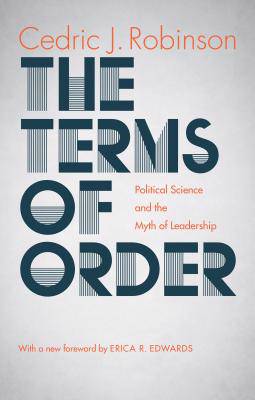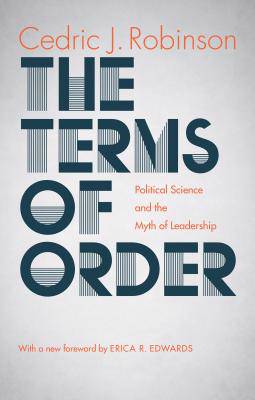
- Afhalen na 1 uur in een winkel met voorraad
- Gratis thuislevering in België vanaf € 30
- Ruim aanbod met 7 miljoen producten
- Afhalen na 1 uur in een winkel met voorraad
- Gratis thuislevering in België vanaf € 30
- Ruim aanbod met 7 miljoen producten
Zoeken
The Terms of Order
Political Science and the Myth of Leadership
Cedric J Robinson
Paperback | Engels
€ 46,45
+ 92 punten
Omschrijving
Do we live in basically orderly societies that occasionally erupt into violent conflict, or do we fail to perceive the constancy of violence and disorder in our societies? In this classic book, originally published in 1980, Cedric J. Robinson contends that our perception of political order is an illusion, maintained in part by Western political and social theorists who depend on the idea of leadership as a basis for describing and prescribing social order.
Using a variety of critical approaches in his analysis, Robinson synthesizes elements of psychoanalysis, structuralism, Marxism, classical and neoclassical political philosophy, and cultural anthropology in order to argue that Western thought on leadership is mythological rather than rational. He then presents examples of historically developed "stateless" societies with social organizations that suggest conceptual alternatives to the ways political order has been conceived in the West. Examining Western thought from the vantage point of a people only marginally integrated into Western institutions and intellectual traditions, Robinson's perspective radically critiques fundamental ideas of leadership and order.
Using a variety of critical approaches in his analysis, Robinson synthesizes elements of psychoanalysis, structuralism, Marxism, classical and neoclassical political philosophy, and cultural anthropology in order to argue that Western thought on leadership is mythological rather than rational. He then presents examples of historically developed "stateless" societies with social organizations that suggest conceptual alternatives to the ways political order has been conceived in the West. Examining Western thought from the vantage point of a people only marginally integrated into Western institutions and intellectual traditions, Robinson's perspective radically critiques fundamental ideas of leadership and order.
Specificaties
Betrokkenen
- Auteur(s):
- Uitgeverij:
Inhoud
- Aantal bladzijden:
- 310
- Taal:
- Engels
Eigenschappen
- Productcode (EAN):
- 9781469628219
- Verschijningsdatum:
- 1/04/2016
- Uitvoering:
- Paperback
- Formaat:
- Trade paperback (VS)
- Afmetingen:
- 150 mm x 230 mm
- Gewicht:
- 403 g

Alleen bij Standaard Boekhandel
+ 92 punten op je klantenkaart van Standaard Boekhandel
Beoordelingen
We publiceren alleen reviews die voldoen aan de voorwaarden voor reviews. Bekijk onze voorwaarden voor reviews.











